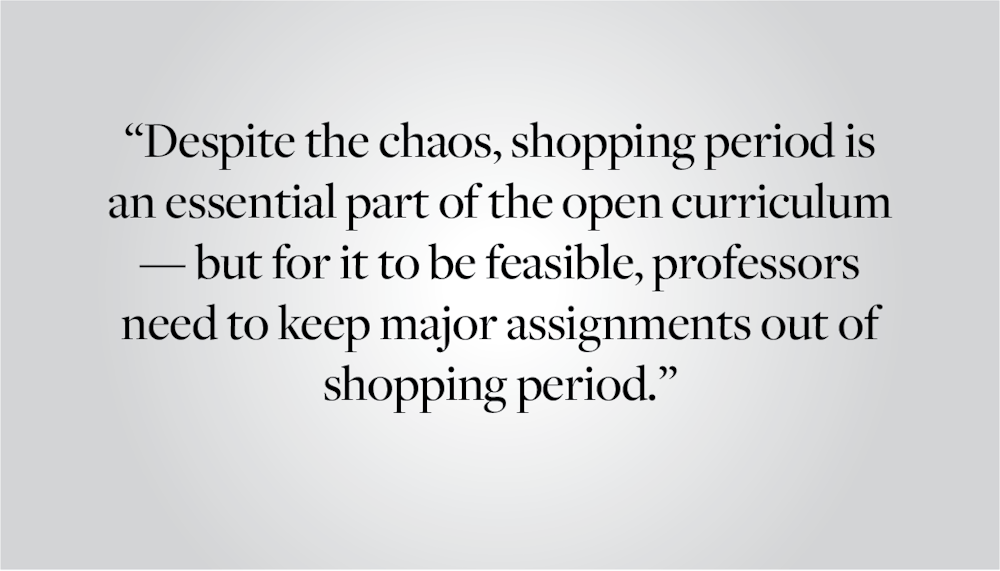As shopping period rolls around once more, every student at Brown is reminded of the joys and challenges of the open curriculum. The two weeks at the beginning of each semester find students packing into lecture halls, sending flurries of emails begging for override codes and juggling lengthy to-do lists to keep up with all the classes they are considering. Despite the chaos, shopping period is an essential part of the open curriculum — but for it to be feasible, professors need to keep major assignments out of shopping period.
According to University resources, shopping period is a “hallmark of the Brown open curriculum” which “provides students the ability to explore subject matters in line with their interests.” Shopping period grants students the chance to try a variety of classes, meet professors and test out different schedules. Because the open curriculum offers so many options, students need this time to explore classes and make informed decisions about how to spend their semesters.
Of course, that exploration requires that students make time to attend and keep up with many classes. Shopping period can be stressful for students trying to manage work for all of the classes they are shopping, a number which can end up as double or triple a full course load. No one wants to come out of shopping period registered for a course only to have eight late assignments due. But the choice between that or dropping an otherwise intriguing class often arises when there are major assignments during shopping period.
To be clear, not all assignments are equal in scope or equal in the burden they place on students. Assigning a lengthy essay differs greatly from having students try a weekly problem set or an ungraded discussion post. An assignment due the first or second time a class meets is also quite different from an assignment due the last day of shopping period, once many students have settled their schedules. Professors must exercise discretion when planning assignments at the beginning of a new semester.
We understand the value of engaging seriously with class material during these two weeks and appreciate that students should get a sense of what assignments are like before they are locked into their courses. But we ask that professors remember the important role shopping period plays in cultivating academic exploration. Students are disincentivized from exercising their intellectual curiosity when professors frontload coursework.
Professors, be cognizant of what class you are teaching. Students taking Orgo during shopping period are likely to stay in the class to fulfill concentration requirements. But students flitting in and out of seminars to manage their schedules, concentration requirements and interests are likely shopping many classes. Early assignments for the former are pretty reasonable, for the latter a potentially unnecessary stressor for students.
If you are a faculty member assigning work during shopping period, consider making those first couple of assignments ungraded or participation-based or even implementing a policy that allows students to drop their lowest grade from a series of assignments.
Put simply, please just be considerate of students as you plan your classes during shopping period.
Shopping period is an important part of the open curriculum and a Brown education, but it takes sacrifices. Racing back and forth across campus to attend five classes in a row is a hassle for students. Not knowing which or, likely worse, how many students are taking your class must be a pain for professors. And students should accept that shopping period might always be a bit stressful. But professors should also do what they can to not exacerbate the problem.
Editorials are written by The Herald’s Editorial Page Board. This editorial was written by its members Irene Chou ’23, Yasmeen Gaber ’23, Tom Li ’26, Jackson McGough ’23, Alissa Simon ’25, Kate Waisel ’24 and Yael Wellisch ’26.





